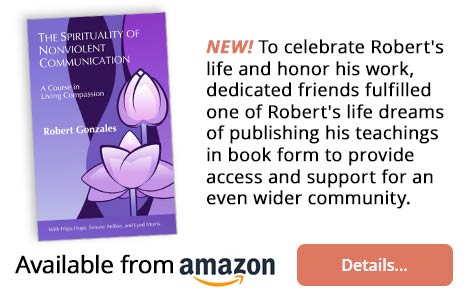

Welcome to the Robert Gonzales Training Legacy. Here you can learn more about Robert and the powerful teachings he dedicated his life to. NVC Academy is proud to house and share with you the complete body of his life's work. We invite you to explore, learn, and help keep his legacy alive!
Robert's passion was in the spirituality of the Nonviolent Communication (NVC) process. He saw NVC both as a process that helps people connect more authentically with themselves and others, and as a spiritual practice and way of living. The worldwide NVC community mourned when Robert died in 2021. He left behind a legacy of work that emerged from a lifetime of inquiry into the intersection between spirituality and human communication. More about Robert.
Trainer Tip
1 - 2 minutes
Trainer Tip: We have a better chance of getting our needs met if we prioritize connecting with one another's needs more than being right. This way we can reduce the chances of conflict arising. We also increase the possibility we can find ways everyone’s needs can be met.
Details...Video
4 minutes
It's normal for us to keep something inside, avoiding sharing it with someone else as the risk may feel too high. Maybe they will reject me, or be offended and not speak to me again? It can be difficult to know when to share your truth and when to keep it inside. In this episode we layout some useful strategies that will help you speak your truth, while still keeping the connection.
Details...Trainer Tip
1 - 2 minutes
Trainer Tip: Wanting collaboration? Show you value the other person's needs as much as your own. After you both feel heard, you can make joint decisions about specifics of the agreement, such as "division of work", "scope of project", "when the action will take place", "how it'll be done" and "timing of follow up to see how things went". Read on for an example of how this is applied to asking someone to pitch in with doing chores.
Details...Video
7 minutes
Nonviolent Communication at its core is about the quality of connection that will lead to everybody's needs being met. In this months 'Purpose of NVC' episode, we ask ourselves five questions that help us gain an awareness of where Nonviolent Communication is being used.
Details...Practice Exercise
3-5 minutes
In some situations you might expect people to show a degree of maturity or skill. When they don't, your anger-fueled response doesn't lead to lasting improved relationship change. Instead, find someone who retains focus on your feelings and needs rather than colluding with you about what should(n't) be. This can support greater acceptance, grief, vulnerability, groundedness and discernment, from which next steps can arise.
Details...Trainer Tip
2 - 3 minutes
Trainer Tip: When they say "no", acknowledge what people are saying "yes" to. From there, you persist towards a resolution that values both party's needs, without demand. Persisting is when we try to meet needs by continuing to connect with another. Demanding is when we insist someone do something, or else face negative repercussions. Showing care and willingness to work with people can help them to want to collaborate and resolve conflict.
Details...Video
7 minutes
When people get hurt or harmed, how can we restore trust, safety and connection in the community? A restorative approach which focuses on who got hurt and how can we restore it? Rather than whose fault is it and how can we punish them?
Details...Practice Exercise
1-2 minutes
Use this interactive empathy exercise to track the relationship and shifting of body sensations, feelings and needs as you note them out loud.
Details...Video
4 minutes
Receiving anger from another can be a reactive trigger for many of us. In this brief segment, Arnina provides us a strategy for staying in the conversation instead of physically leaving.
Details...Trainer Tip
1 - 2 minutes
Trainer Tip: We all have the same needs, but may prioritize different needs at different times -- and that order of prioritization may look different from other people's perspectives. If your prioritization of needs isn't the same as another's, that doesn't mean there's something wrong with you nor them. We can look for many ways to meet our prioritized needs.
Details...

